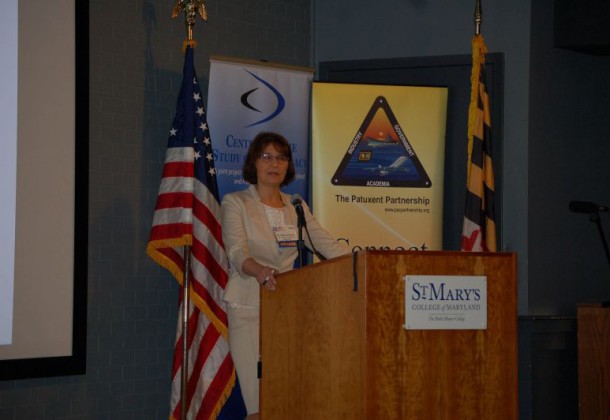God is Not Dead

Religion in Civil Society: The Impact of Religious Movements on International Relations – the title alone is daunting, the global implications terrifying – and the bottom line at home is chilling as well: “The US government was not built for this.”
Private voluntary organizations as well as international private and governmental agencies became focused after the worldwide devastation of World War II. The US government’s international institutions grew out of World War II as well. Post World War II communism was on the rise. By 1966, Time Magazine’s cover asked “Is God Dead?”
A speaker from academia working on religion and foreign policy opened one of the forum’s panels noting that magazine query. “Atheistic communism was on the rise,” the speaker said. “From the middle of the 20th century, things don’t look good for religious actors. Fast forward. God is not dead.”
Provocative discussion at the 2015 Patuxent Defense Forum brought experts and attendees from both religious and defense related organizations to few conclusions, but delivered a significantly broader understanding of faith and religion to the fore. Sponsored annually by The Patuxent Partnership and The Center for Democracy, the day-long agenda addressed faith-based groups, religious activism, religious tensions around the world, and US efforts to retain sustainable and humanitarian development through the fray.
The rule of the forum is that the experts speak freely and openly but their comments cannot be attributed to them or the organizations they represent. The annual “big think” collaboration draws leaders in each year’s topic from the top ranks of academia, government, industry, and military decision-makers and strategists.
This year’s theme, explained Maij Harkonen, executive director of the Center for the Study of Democracy at St. Mary’s College of Maryland, and Bonnie Green, executive director of The Patuxent Partnership, seemed obvious. Current struggles with violent and religious extremism could find no better setting for analysis than at this annual setting, St. Mary’s City, where Maryland was founded in 1634 upon the principle of religious tolerance.
The forum was wide ranging, but its main message was focused: God is not dead. Eight-four percent of the world’s people identify with a religion. It is the task of peacemakers to teach us how to live with our deepest differences, said a representative from an international NGO. We develop our religious beliefs before our political beliefs.
Topics addressed included Islam and Democracy in the Muslim World, Citizenship in Israel, Racism, the Etymology of “VooDoo,” Cyber Power, and Peacemaking.
Advice was offered specifically: “Include women.” “Harness the Golden Rule, every society has one.” “The US’s ability to mitigate religious tensions has a lot to do with how the US treats Muslims.”
Advice was offered spiritually: “Let the best of faith defeat the worst of religion.” “Islam is the religion of mercy.”
And questioning was direct: “Is democracy purely a Western construct?”
Intricate explanations were unwoven, including details of how Harry Truman’s wording created a “Jewish state,” which legitimately outlaws citizenship to Palestinians born in Israel. But international law may now present a reinterpretation that not only restores Palestinian citizenship, but requires reparations.
Despite details such as this, parsed and argued over scores of years, we know “very little about the religious landscape of the world,” says a political scientist. Another political scientist of another university is trying to map religion and ethnicity, the overlaps producing a great many nuances within one religion. She seeks to see how overlaps in ethnicity and religion might impact violent versus peaceful outcomes. Democracy is a significant part of that answer. Other studies seek what makes democracy successful in some Muslim counties but not others.
Increasingly the US government is stepping up its initiatives to best assess the complexities of extremism and develop strategies to counter terrorist tactics. Religion is a powerful piece of the puzzle. The new Office of Religion and Global Affairs, recently reconfigured within the US State Department, was represented at the forum and presented an overview of the growing attention being paid in this area. Social media is being deployed to call out those sites that promote hate.
The battle fronts are shifting. And a new array of warriors are aware.























